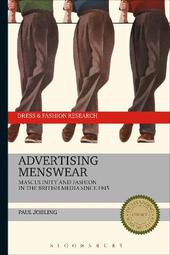
|
Advertising Menswear: Masculinity and Fashion in the British Media since 1945
Paperback / softback
Main Details
| Title |
Advertising Menswear: Masculinity and Fashion in the British Media since 1945
|
| Authors and Contributors |
By (author) Paul Jobling
|
| Series | Dress and Fashion Research |
|---|
| Physical Properties |
| Format:Paperback / softback | | Pages:272 | | Dimensions(mm): Height 234,Width 156 |
|
| Category/Genre | History of fashion |
|---|
| ISBN/Barcode |
9781474254465
|
| Classifications | Dewey:391.1094109045 |
|---|
| Audience | | Professional & Vocational | |
|---|
| Illustrations |
50 bw illus
|
|
Publishing Details |
| Publisher |
Bloomsbury Publishing PLC
|
| Imprint |
Bloomsbury Academic
|
| Publication Date |
30 July 2015 |
| Publication Country |
United Kingdom
|
Description
Choice Outstanding Academic Title 2014 In what was a golden age of British advertising, the notion of the 'peacock male' was a strong theme in fashion promotion, reflecting a new affluence and the emergence of stylish youth cultures. Based on a detailed study of rich archival material, this pioneering study examines the production, circulation and consumption of print, television and cinema publicity for men's clothing in Britain during the second half of the twentieth century. The study explores design issues and period style in advertising, the role of market research and consumer psychology in determining target audiences, the idea of the 'new man' in representing fashionable masculinities, and the various ways that menswear retailers and brands dealt with sex and gender, race, class and age. From y-fronts to Austin Reed suits to Levi's jeans, menswear advertising epitomised the themes, stereotypes, contradictions and ambiguities of masculinity in an age of great social change. This meticulously researched and detailed work of scholarship will be essential reading for students and scholars of fashion, history, sociology, advertising, media, cultural and gender studies.
Author Biography
Paul Jobling is Researcher in Arts and Architecture, University of Brighton, UK. He is the author of Man Appeal (Berg, 2005).
ReviewsFascinating as a study of changing attitudes and technologies over the second half of the 20th century ... The attempts of menswear advertisers to anticipate, respond to, and initiate changes from a postwar setting of mainly static images and relatively static mores to the unimaginably transformed, contemporary technologies and standards is chronicled in a straightforward and entertaining way ... The book deserves a broad audience. * CHOICE * Rooted in archival research and through rich illustrations and extensive appendices, Jobling has given us yet another piece of quality scholarship. This text will appeal to researchers interested in the representation of clothing and fashion, masculinities and 'Britishness', and to scholars of dress and fashion history, media culture, modern British history and transatlantic culture more generally. -- Mario J. Roman, London College of Fashion * Costume * Based on a detailed study of rich archival material, this pioneering study examines the production, circulation and consumption of print, television and cinema publicity for men's clothing in Britain during the second half of the twentieth century. * Costume Society of America * This book provides a well-structured analysis of advertising menswear in Britain, gauging the dynamics of war, class, race, gender, age and textile science that transformed the communication medium. A compilation of striking imagery, visual analysis, compelling discourse and chronology establishes this scholarship as a decisive resource informing the methodology of past and contemporary global menswear brands. -- Alphonso McClendon, Drexel University, USA Paul Jobling's Advertising Menswear is that rare study that is able to combine distinctive close reading of individual cultural texts with expansive and thickly documented historical reconstruction. Truly remarkable in its reach and sensitivity, this book should stand as a model for measured inquiry at the intersection of masculinity and material culture. -- James Hall, Rochester Institute of Technology, USA
|